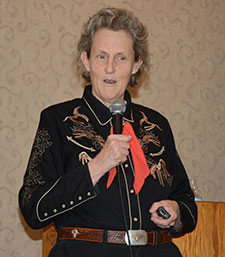 "When I first started out, I thought I could change the world if I had the right equipment. Later, I realized that a big part of everything is the people."
"When I first started out, I thought I could change the world if I had the right equipment. Later, I realized that a big part of everything is the people."Those words could ring true for almost any industry, but when spoken by Temple Grandin, you know she's talking about animal agriculture. Grandin, a professor of animal science at Colorado State University, was diagnosed with severe autism at a young age, but she did not let that stop her from becoming one of the world's most renowned experts in cattle stockmanhip. She shared some of her insights on animal care at UW-Extension's Dairy and Beef Well-Being Conference late last month.
"Big ag and little ag need to stop bashing each other. Consumers now believe that big is bad," Grandin said. "What I have found is that badly managed is bad." Equipment plays a role in providing proper care, but Grandin emphasized the importance of appropriate training for employees and adequate staff to get the job done right. "Don't understaff and overwork," she advised.
Grandin is a proponent of simple scoring systems (such as the one created for lameness) to measure animal care on farms. "You've got to measure things," she said. Grandin likened it to the police monitoring speed limits. She asked the audience, "What would the highways be like if there was no measurement of speed?"
When it comes to management and welfare, she said we must look at genetics, too. "If we push biology too hard, we get into trouble," she said, mentioning physical conformation problems and the loss of disease resistance in some species of livestock. She also warned against selecting for just one trait. "Never overselect for a single trait . . . if you make a mistake, you're going to get into a pile of trouble."
And, of course, calm animal handling is a major priority for Grandin, who has worked with slaughterhouses across to world to improve their animal handling systems.
"Good stockmanship pays," she said. "Calm animals are more productive. Animals that are afraid of people will have fewer piglets and give less milk. Stockmanship matters."
She gave the livestock industry credit for the changes in animal handling that have occurred over the past few decades. "The industry has gotten so much better, but the public doesn't know about it," Grandin said. "Agriculture has to get out there and communicate."
(c) Hoard's Dairyman Intel 2015
May 11, 2015








